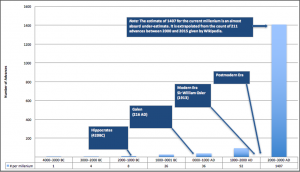Healthcare as a Game of Chess: Do the Math
October 6, 2021
A serial blog on the future of healthcare by Charles J. Shanley, MD and David Ellis, MS
We have all read or heard sarcastic commentary that it would be possible to retire the national debt if we had a penny for every time someone wrote, “AI is transforming the practice of medicine.” Maybe the statement is just smoke, but if so, there could be a fire lurking behind it. Fundamentally, the practice of medicine is the prevention or, if that is not possible, the diagnosis and treatment of conditions affecting human health. AI is transforming current practice while almost imperceptibly taking over many traditionally essential functions of the physician. (Indeed, we would argue that the practice of postmodern medicine will focus on the enhancement of healthy condition, not just the prevention or treatment of unhealthy conditions, but that is for a future blog post.)
The questions, as always in this blog, are when and with what effect?
Leaving aside, for now, the question of effect, this month we consider timing by analyzing (in a quasi-empirical manner) the exponential growth of paradigm-shifting advances in healthcare. Our analysis is based on the fairly well-known fable of the emperor who asked the inventor of chess[i] what he wanted as a reward for his delightful invention. The emperor laughingly agreed to the savvy inventor’s request for a grain of rice placed on the first square of the chessboard to be doubled on each succeeding square.
At the end of the first row of eight squares, the inventor had amassed 128 grains of rice—considerably more than the grain he started with, but still barely enough for a meal. By the end of the second row (square 16) there were about 33,000 grains—a little over 1 lb. The emperor could still chuckle (perhaps a little nervously) at the end of the third row, where the pile grew to 8.4 million grains—about 336 lbs or 0.16 tons. But on square 32, at the end of the fourth row, the pile was 2.15 billion grains, or nearly 86 tons—a substantial sum even for our fictional emperor’s plentiful granary, and no laughing matter. By the 64 and last square, the emperor owed the inventor of chess more than all the rice in the land.
Where is healthcare today on its exponential curve of advances? Suppose healthcare began with the primitive herbal medicine known to exist in the fourth millennium BCE[ii] and that it represents the first grain laid on a healthcare chessboard whose squares represent millennia. Today, we are just at the beginning of the third millennium CE and in terms of seminal advances (such as the completion of the Human Genome Project, a prosthetic bionic eye, a vaccine for HPV, face transplantation, kidneys and livers grown in vitro, and most recently RNA vaccines for COVID-19) we have already more than doubled all the major advances made in the second millennium—from 92 in the 20 century to 211 from 2000 to 2015.
Figure 1, drawn from a Wikipedia entry for “Timeline of medicine and medical technology,”[iii] suggests that “Game Over” may be imminent for the business and practice of healthcare as we know it today. By imminent, we do not mean by the end of the millennium, or even by the end of the 21st century. We mean on our around the end of this decade.
In Technology and the Future of Healthcare: Preparing For the Next 30 Years,[i] first published by the American Hospital Association Press in the year 2000, one of us predicted change of epic proportions by 2030. So far, unless derailed by global cataclysm, that prediction is on track. 2030 was a somewhat arbitrary selection of the year when the change would be visible—it could be 2040 (though not beyond, we believe), or it could even be 2025—but the fact remains that epic change is afoot within the lifetimes of the younger physicians practicing today.
Our leading healthcare institutions are contributing significantly and adapting successfully to the change. Wayne Health, for example, has a highly successful mobile health service that moves the mountain of preventive care to patients unable or unwilling to expend personal resources on traveling to providers in traditional brick and mortar settings.[ii] But in the process, how many hospitals (as we know them) will close, and how many careers will be dramatically transformed? We do not intend an exercise in scaremongering, shortsightedness, or any number of things, but if there is even no more than a glimmer of possibility in the prediction of epic change within a decade or so then it would seem both wise and urgent to adapt, embrace and help to shape the future of AI in healthcare …. or risk having AI define that future for us.
As always, we welcome your opinions.
[i] Available at https://www.wiley.com/en-us/Technology+and+the+Future+of+Health+Care%3A+Preparing+for+the+Next+30+Years+-p-9780787957377.
[ii] See Greene, Jay (2021). “Health care goes mobile: COVID-19 experience speeds doctors’ transition to increased patient outreach.” Crain’s Detroit Business, September 26. Accessed at https://www.crainsdetroit.com/health-care/health-care-goes-mobile-covid-19-experience-speeds-doctors-transition-increased-patient
——————————-
[i] Chinese chess appears to have been developed around 800 CE independently of the chess we know in the West, developed in Persia and India at about the same time. Both are played on an 8×8 grid and are similar in grand strategy (two opposing armies) and game pieces but the moves are different. Both games are equally challenging and absorbing.
[ii] Actually, trepanning is the oldest surgical procedure for which there is archaeological evidence dating back to 6500 BCE (Wikipedia entry on “Trepanning.”)
[iii] These data, used in constructing the chart, were derived from WIkipedia’s entry for “Timeline of medicine and medical technology” at https://en.wikipedia.org/wiki/Timeline_of_medicine_and_medical_technology.
[iv] Available at https://www.wiley.com/en-us/Technology+and+the+Future+of+Health+Care%3A+Preparing+for+the+Next+30+Years+-p-9780787957377.
[v] See Greene, Jay (2021). “Health care goes mobile: COVID-19 experience speeds doctors’ transition to increased patient outreach.” Crain’s Detroit Business, September 26. Accessed at https://www.crainsdetroit.com/health-care/health-care-goes-mobile-covid-19-experience-speeds-doctors-transition-increased-patient

